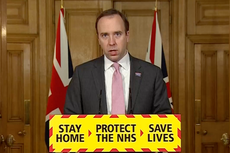Return to 0.7 per cent aid pledge will have to wait for recovery from Covid, Dominic Raab warns MPs
Former solicitor general warns cut is ‘unlawful’ without new legislation
The UK’s spending on global aid will not return to its previous level of 0.7 per cent of national income until the economy has recovered from the “battering” from coronavirus, foreign secretary Dominic Raab has told MPs.
Mr Raab was unable to provide a fixed level of debt or deficit would would allow a return to the United Nations target - enshrined in law by David Cameron in 2015 - and said it would have to “compete” with other demands on government spending.
His comments will alarm development charities who fear that the temporary move to 0.5 per cent announced by chancellor Rishi Sunak last November may effectively become permanent as the country continues to struggle with the fallout from Covid-19.
Mr Raab today announced allocations of funding totalling just under £10bn for 2021/22, down sharply from £15bn under the previous commitment.
A former senior law officer warned that the cut will be illegal unless the government passes legislation to override its statutory duties - something which would expose ministers to a potential rebellion by backbench Tories.
Lord Garnier, who served as solicitor general in Mr Cameron’s government, said that Boris Johnson is under “a clear legal obligation” to uphold the binding target until the law is changed.
“Until parliament changes that law on the statutory duty to meet the 0.7 per cent target, the government must aim to hit it,” the Tory peer wrote in a letter to the Commons International Development Committee.
“It cannot deliberately aim off or fire blanks… It cannot legitimise a failure to hit the target by announcing in advance its intention to fail.
“Whilst accepting that for the Foreign Secretary deliberately to breach his statutory duty to meet the 0.7 per cent target will not lead to his prosecution, it would nonetheless be unlawful and something for which he could be held to account by parliament. It would do neither his reputation as a lawyer nor the government’s domestic or international standing any good to be seen once again to be flouting a clear legal obligation.”
Speaking as he became the first foreign secretary ever to address the committee on Tuesday, following the merger of the Department for International Development into the Foreign Office, Mr Raab said he would “look carefully” at Lord Garnier’s letter, but insisted that the issue was “difficult and complex”. A decision on how to proceed would come “in due course”, he said.
“I’m not flouting the law,” Mr Raab told the cross-party committee. “There are different views on it.”
He dismissed as “nonsense” the idea that ditching the commitment to meet the United Nations 0.7 per cent target had damaged the UK’s reputation overseas and said Britain should not “self-flagellate” over its decision.
But asked when Britain will return to the UN target, he was unable to give a date.
“Ultimately, I would want to talk to the chancellor about that,” Mr Raab told the committee. “It is difficult to give you the precise metrics we will have to see in terms of the public finances.
“There’s been a big structural hit to the public finances as a result of coronavirus. It will be contingent on us being able to correct that.
“Obviously, as secretary of state, I want to see us get back there as soon as possible and that’s also the view of both the prime minister and chancellor of the exchequer.”
Mr Raab said he “did not recognise” reports that UK ambassadors had been told to find cuts worth 50-70 per cent of aid budgets in their countries, but told MPs: “You have to cut your coat according to your cloth.”
He said it was not possible to give a precise deficit or debt level at which the UK would once again be able to afford 0.7 per cent of national income for aid, and suggested that a return to the UN target would depend on financial pressures from other government priorities.
“It will be a mix of art and science,” he told the committee. “Of course there will be competing pressures both domestically and internationally on a shrunken fiscal envelope.
“The question will be contingent on how quickly the economy rebounds… We have got to be confident that we have recovered from the fiscal battering Covid has wreaked on the economy and the public finances.”
In a written statement to parliament, Mr Raab said that overseas development assistance spending would in future focus on the priorities of climate and biodiversity; Covid and global health security; girls’ education; science and research; defending open societies and resolving conflict; humanitarian assistance; and promoting trade.
He told the committee that he wanted ODA cuts to be implemented according to strategic priorities, rather than subject to “salami-slicing” across the piece.
Join our commenting forum
Join thought-provoking conversations, follow other Independent readers and see their replies
Comments



Bookmark popover
Removed from bookmarks